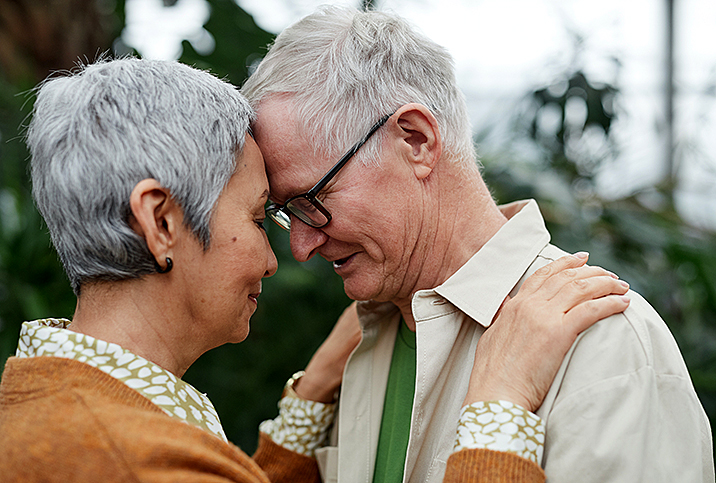Libido Loss in Older Men: Stigma and Self-Reproach

Low libido is a condition in which sexual desire is diminished or lost. Older men who experience loss of libido may experience a range of psychological, emotional and physical difficulties. Here’s what you should know:
Gradual loss
Most men begin losing libido around age 35, and testosterone levels continue to decline at the average rate of about 1 percent per year after age 40, according to the Mayo Clinic. It is a relatively commonplace disorder with repercussions that may include impotence, low self-image, a general feeling of lost masculinity and depression.
The gradual loss of virility can be particularly troubling for a man whose masculinity has always been closely tied to his sexual identity. Tacit cultural “myths” about male sexuality—that men are always in the mood for sex, as one example—certainly stigmatize and exacerbate the problem.
It is a medical fact that loss of testosterone, the primary sex hormone in males, is a natural part of the aging process, but a 2016 study in Archives of Sexual Behavior found that 54 percent of men over the age of 70 continued to enjoy an active sex life. Clearly, aging does not mean older males must come to terms with diminished sexuality.
Libido loss & its emotional fallout
Coping with the physical and cognitive aspects of aging—hair loss, reduced muscle mass, faulty memory—is troubling enough. Loss of sexual desire can do considerable damage to a man’s self-image and his relationship with a partner, leaving him feeling lost, frustrated and struggling with a tangle of other issues.
Guilt, anxiety and frustration are common responses to lost libido, especially for men who have always enjoyed a healthy and vigorous sex life. An unhappy and unfulfilled partner can magnify feelings of guilt and place undue stress on an older man seeking solace for his bruised ego.
Even men who come to terms with the inevitability of aging struggle with loss of libido and what they may see as the end of their sexual existence.
Treatment options
For older men with a low testosterone level, regular supplements or shots can make a difference. A study published in the Journal of Clinical Endocrinology & Metabolism revealed that one year of testosterone therapy significantly boosted sexual feeling among 275 male subjects with an average age of 72.
For some men, diet, exercise and other lifestyle changes can help alleviate the symptoms of low testosterone. Certain supplements have also shown promise in counteracting low testosterone.
Giddy Health Male Libido vitamins provide natural testosterone support, with clinically proven ingredients extracted from the eurycoma longifolia plant, as well as zinc, ashwagandha, and D3 to support healthy testosterone levels and boost libido. Created in conjunction with industry leaders and researchers, these capsules utilize microbead technology for a timed release throughout the day, further helping to reduce stress and boost testosterone production.
In addition, selective serotonin uptake inhibitors (SSRIs), such as Prozac, which elevate serotonin levels in the brain, are frequently prescribed for men who need help overcoming the depression that results from a loss of sexual desire. However, before you decide on this option, talk to your doctor about how these medications may impact erectile function.
Some men respond positively to cognitive behavioral therapy to process their emotions. Therapy may also help to reframe how you approach sex, showing you how to emphasize touch and sensuality rather than focusing on penetrative intercourse and orgasm. Rekindling romance may help partners communicate and restore a lost or damaged physical connection.
In some cases, a combination of counseling and medication can be effective, though it should be noted that the side effects of erectile dysfunction (ED) drugs such as sildenafil (Viagra) and tadalafil (Cialis) occur most often in older men.
Definitely not the end
A decrease in libido, though a natural part of the aging process, need not herald the end of one’s sex life or doom an older man to a relationship without intimacy. You’re not alone in facing an invisible problem your doctor knows nothing about (unless you bring it up): 1 in 4 men suffer the emotional consequences of low libido. So, talk about it.
This is a treatable problem and can often be resolved with simple lifestyle adjustments. And learning to accept change can be an important asset in any relationship, and in life, as well.


















